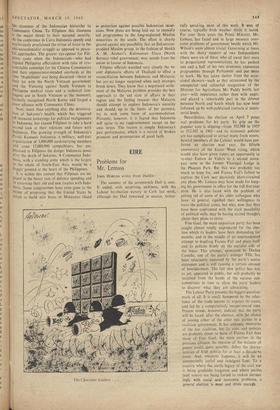EIRE Problems for Mr. Lemass
JOHN HORGAN writes from Dublin : The summer of the seventeenth Dail is over. It ended, with surprising swiftness, with the Labour by-election victory in Cork last week, although the Dail remained in session, techni-
7'he Chocolate Soldiers . .
cally speaking. most of this week. It was, of course, typically Irish weather while it lasted. For over three years the Prime Minister, Mr. Lemass, has faced and in large measure over- come problems. of government beside which Mr. WiNon's seem almost trivial. Governing at times with the shaky support of two Independents (there were six of these, who all owed their seats to proportional representation), he has pushed one and a half of his two economic expansion programmes through Parliament and put them to work. He has taken shelter from the occa- sional showers—such as that occasioned by the unexpected and colourful resignation of the Minister for Agriculture, Mr. Paddy Smith, last year—with impatience rather than with anger, and played a remarkable part in the detente between North and South which has now been followed up by well-publicised contacts at minis- terial levels.
Nevertheless, the election on April 7 poses real problems for his party. Its grip on the popular vote is slipping—from 592,988 in 1957 to 512,102 in 1961—and its economic policies are too complicated to attract many fresh voters. Several members of the Cabinet would have pre- ferred an election next year, the fiftieth anniversary of the Easter Week rising, which would also have given voters an opportunity to re-elect Eamon de Valera to a second seven- year term in the former Viceregal Lodge in the Phoenix Park. But this was probably too much to hope for, and Fianna Fairs failure to capture the Cork seat decisively short-circuited any plans Mr. Lemass may have made for keep- ing his government in office for the full five-year term. He is also faced with the problem of getting rid of some of his older colleagues who have, in general, signified their willingness to leave the political arena, but who, now that they have been confronted with the stark possibility of political exile, may be having second thoughts about their plans to retire.
Fine Gael, the main opposition party, has been caught almost totally unprepared for the elec- tion which its leaders have been demanding for months, and in the middle of an unprecedented attempt to leapfrog Fianna Fail and place itself and its policies firmly on the socialist side of the fence. This attempt, sponsored by Declan Costello. one of the party's younger TDs, has been reluctantly endorsed by the party's senior statesmen and is still causing a certain amount of bewilderment. The full new policy has not, as yet, appeared in public, but will probably be snatched from the hands of the various sub- committees in time to allow the party leaders to discover what they are advocating.
The Labour Party presents the biggest question- mark of all. It is small, hampered by the reluc- tance of the trade unions to espouse its cause, and led by a comparatively inexperienced man.
Present trends, however, indicate that the party will be faced, after the election, with the choice of joining either of the other two parties in a
coalition gdvernment. It has unhappy memories of the last coalition, but its aims and policies
are probably closer to those of Fianna Fail than those of Fine Gael, the main partner in the previous alliance. Its exercise of the balance of power could, .quite possibly, define the charac-
teristics of Irish politics for at least a decade•to come. And. whatever happens, it will be an
unexpectedly joyful and indulgent Lent. To a
country where the sterile legacy of the civil, war is being gradually forgotten and where parties
(and voters) are being forced to reckon increas- ingly with social and economic problems, a general election is meat and drink enough.


































 Previous page
Previous page